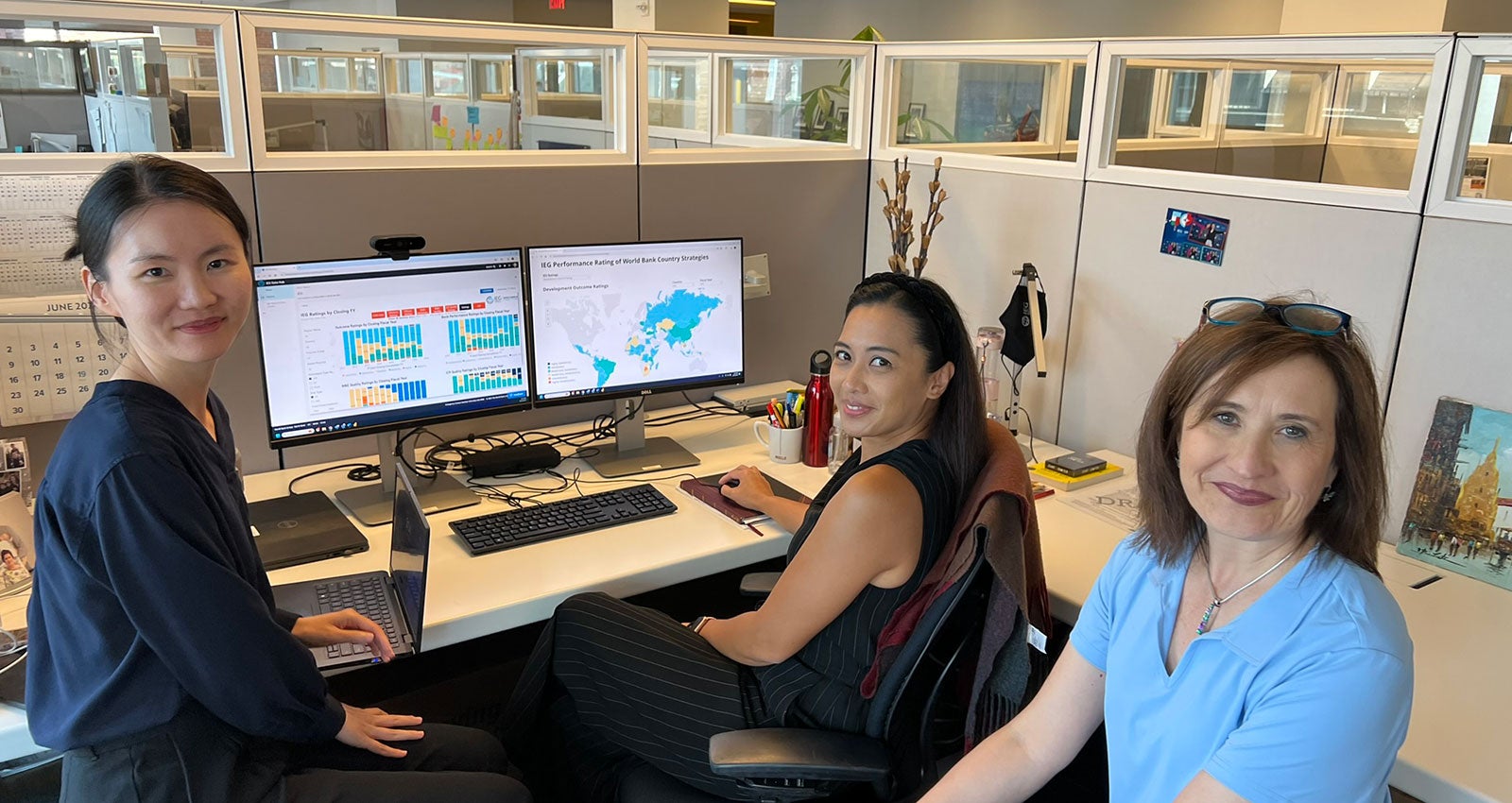The Independent Evaluation Group data busters
When you need data, who are you going to call?
When you need data, who are you going to call?
By:
From left to right: Kristin Strohecker, IEG Program Manager for Data, Systems, and Staff Learning, Mari Noelle Roquiz, IEG Monitoring and Evaluation Specialist, and Tao Tao, IEG Data Scientist. Photo: Jeeyeon Seo/IEG
Every rigorous and insightful evaluation starts with good data. There is a voracious appetite for data across the evaluation practice. The evaluations and validations of the Independent Evaluation Group (IEG) also generate valuable data that can provide useful operational insights. At the completion of every lending project, the World Bank conducts a self-evaluation which assesses and rates a number of project qualities, such as WB performance, outcomes, and lessons learned. IEG validates every single one of these self-evaluations. For a strategic selection of projects, IEG conducts a full evaluation, known as a Project Performance Assessment Report (PPAR). The World Bank also conducts a self-evaluation at the end of every Country Partnership Framework (CPF), the strategy that guides the Bank’s support for member countries, in what is called a Completion and Learning Review, which is also validated by IEG.
These evaluations and validations generate a wealth of data that can provide useful operational insights, such as outcome trends in a specific sector, or lessons to inform the design of future projects. And when teams need data, who do they call?
In IEG, the data team consists of Kristin Strohecker, IEG Program Manager for Data, Systems, and Staff Learning, Mari Noelle Roquiz, IEG Monitoring and Evaluation Specialist, and Tao Tao, IEG Data Scientist. Whether it is IEG evaluation teams looking for access to World Bank Group corporate data and documents, or staff in search of project and country ratings data and lessons, it is these three women who answer the call.
Different roads brought Kristin, Mari Noelle, and Tao to IEG’s data team. A seasoned systems and data expert at the World Bank, Kristin provides strategic direction to the team. Mari Noelle, who spent several years working within evaluation teams as a data analyst, combines the skills of a data scientist and an evaluator. Tao is a savvy data science practitioner who, like Mari Noelle, has experience working in evaluation teams and understands their work and needs.
The team collaborates across the World Bank Group and navigates its many systems to fulfill internal and external-facing demands. Within IEG, they ensure data is well organized and readily available to evaluators. Externally, they make IEG data on project ratings and lessons accessible through structured databases, dashboards, and visualizations. World Bank Group staff outside of IEG, and development practitioners worldwide, can harness IEG’s data to inform the design and implementation of new projects.

Navigators
Data comes in countless forms, from a myriad of sources, and is hosted in multiple databases. The data team develops tools and platforms to guide evaluators through this tricky terrain and helps them access the data they need efficiently. The IEG Data Hub, for example, is a self-service data access platform with custom-built report templates that combines IEG-owned datasets with live World Bank operational and corporate datasets. “The Data Hub is very important because in addition to ease of use, it introduces consistency, efficiency, and greater quality assurance in how IEG accesses data,” says Kristin.
IEG’s data is a global public good and the IEG data team has built the infrastructure to make them accessible to Bank Group staff and development practitioners. By navigating a series of dashboards, teams can easily explore data from project ratings, project lessons, and insights from the World Bank’s program in a specific country. In this blog, Tao explains what each dashboard has to offer and how they can benefit users.
Facilitating innovation
Platforms like the IEG Data Hub make data access more efficient and free up staff time that can then be devoted to innovation and experimentation. “We strive to automate processes, share reproducible code, and spare teams from having to reinvent the wheel so they have time for analyses and innovative approaches,” explains Tao. “We then support teams in integrating the results of their experiments into the mainstream,” adds Kristin.
A marathon, not a sprint
The team works in a constantly evolving environment, where they embrace new technologies, and the changes that come with them, without compromising the delivery of their ‘bread & butter’ work of ensuring access to quality data. They recently introduced a collaboration tool that allows IEG staff to share solutions, data, and code across teams. They have also been experimenting with artificial intelligence (AI) applications, paying close attention to the potential risks as well as benefits of the technology and the policies that govern its use.
For example, they have been testing the use of AI to conduct further analysis of data gathered through IEG dashboards, summarizing lessons or identifying common themes. In this blog, Mari offers three scenarios for using IEG data to understand the performance of projects in a specific sector, the factors contributing to a set of highly rated projects, or to inform the design of new projects. “It’s a marathon, not a sprint” says Mari Noelle.
The IEG Data Team is one of IEG’s vital pillars, champions of data quality, consistency, privacy, reproducibility, and innovation. Looking forward, they will continue to support the evolution of data use, expanding access, and encouraging innovation with ever more efficient systems.
This article is part of IEG Data Week, a week-long focus on IEG data resources, where to find them, and how to make the most of them.
Related

The Independent Evaluation Group (IEG) evaluates the development effectiveness of the World Bank Group. Our work provides evaluative evidence to help the World Bank Group deliver better services and results to its clients. We do so by generating lessons from past experience and accountability to shareholders and stakeholders at large.
IEG is independent of the Management of the World Bank Group and reports directly to the Executive Board.
Add new comment